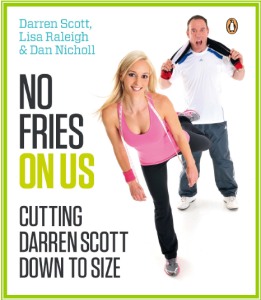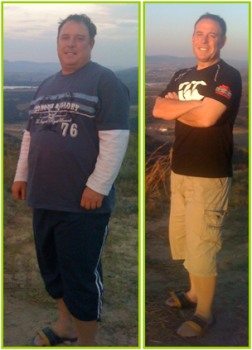No fries on us - cutting Darren Scott down to size is a must-read for anyone who has tried every diet pill on the market and has been on every diet known to mankind. When you read the words “gym and train”, your face needn’t drop with depression and despair. The truth is, the answers are right in front of us, but we choose to ignore them in favour of the easy way out.
In a nutshell, No Fries on us is the story about the dramatic weight loss of TV and radio presenter Darren Scott, with the help of personal trainer Lisa Raleigh and documented by writer and good friend Dan Nicholl.
Aside from the constant giggle throughout your read, No Fries on Us provides informative and practical ways of climbing out of your fat suit. It focuses on both nutrition and fitness.
“If you understand how and why you are doing something incorrectly, chances are you will conquer the battle forever,” says personal trainer Lisa. “People eat badly for two reasons: to fill a gap in their lives or because they simply lack knowledge about food and exercise.”
'Fat boy'
Darren, the man formerly known as “fat boy”, has been fighting the battle of the flab from an early age.
“I’d tried the pill method, I’d tried dieting, I’d flirted very occasionally with exercise, and nothing had kept my weight consistent, let alone my lifestyle healthy,” he says.
Darren’s transformation started in March 2009, when he received an e-mail from Lisa, who challenged him to change the quality of his life with a “once-in-a-life-time opportunity”: training with her and learning to eat correctly forever. Lisa was the female trainer on SA’s The Biggest Loser and had just opened a clinic in Durban.
“I’m still not entirely sure what made me respond to Lisa’s mail,” says Darren. But it’s safe to say that Lisa’s e-mail was Darren’s miracle - it really did change his life.
Following the e-mail, he arranged a meeting with her. “Two simple decisions made me follow through on the agreement I’d given Lisa to embark on the crusade to self-denial…the first was the acceptance that I was starting to look like Eddie Murphy’s title character in the Nutty Professor… and then there was the challenge,” says Darren.
Lisa was concerned about the state of Darren’s health and the bad example that he was setting to the youth: “In my mind, Darren has a social responsibility to look fit and healthy when hosting a sporting show. If the youth see Darren looking that way, they will get the idea that it’s fine to be overweight,” she explains.
Lifestyle diseases
“There are millions of us who are merely living with a diminished quality of life by being overweight and inactive. Diseases such as Type 2 Diabetes, cancer, heart disease, strokes, osteoporosis, inflammation, depression and immune disorders, as well as our cognitive decline, are man-made,”she adds.
Darren’s makeover started with a month-long boot camp.
“The advantage of being at Lisa’s camp, not that I could ever have imagined anything positive about it while I sweated through a week from hell, was the forced discipline,” says Darren.
“Between Lisa shouting at me… and two radio shows to fit in, I was shattered by the end of every day, which meant I’d tumble into bed without the usual dilemma of deciding between a bucket of KFC or a couple of Big Macs for dinner. The short term boost of comfort food had been replaced with a long term sense of becoming a healthier person.
“It’s one thing to haul yourself out of bed as part of a month’s structured training, where other people are directing your movements and ensuring you toe the line. But motivating yourself is an entirely different prospect,” says Darren.
Now, you must be thinking, “yeah yeah, I’ve heard it all before, and I can’t afford a trainer anyway!”
Well, you can.
“Personal trainers aren’t that expensive,” says Lisa. “A trainer three times a week is probably cheaper than your current lifestyle. Add up how much you are spending on a new wardrobe once a year because your clothes don’t fit you, together with how much you spend eating out on takeaways, snacks, and alcohol. The rate for a trainer is approximately R180 and R250 an hour for a one-on-one session, and between R140 and R200 for a session sharing.”
However, you can also get fit by exercising at home, Lisa adds. “Exercise what you can, with what you've got, from where you are,” she says. “You can run anywhere, use your body as a weight, and use things around your house for weights, even items like water bottles filled with sand. And, dips off the end of your bed, push-ups, lunges and squats require no equipment!”
After losing 20 kilograms in 3 months, Darren got into the habit of training up to an hour a day - cardio mixed with upper and lower body weight training on his own, three or four times a week. He started training at home using a few pieces of equipment such as, dumb bells, a bar bell, weight plates, a ball, a bench, a skipping rope, a rowing machine or treadmill and a mat!
No fries on us includes a collection of easy to follow exercises (accompanied by photos) for the gym or at home.
Crash diets don’t work
Darren also had to change his eating habits. After following a detox diet for a week, Lisa taught him how to prepare and eat healthy meals.
“Following a balanced eating plan is key,” says Lisa. “I am not a believer in diets, but rather in adopting a sustainable lifestyle plan. An ideal diet consists of water, fruit, vegetables, starch, legumes, 50% of carbohydrates, 30% of protein, and 20% of fat,” she says.
You will find a one-week eating plan, healthy substitutes for foods we could do without, a piece on understanding food labels, the basic guideline for calorie counting, delicious recipes and much more in the book, to help you on your way.
”High-protein or low-calorie diets really don’t work,” Lisa warns. “When you cut out carbohydrates, your body starts using protein for energy. However, the body is not efficient in using proteins as an energy source. Protein diets give you a false sense of weight loss when you jump on the scale week after week, losing ridiculous amount of weight. This is simply because muscle is denser and heavier than fat and takes a lot of water with it when you lose it,” she explains.
Metabolism
“So, everyday you are following this diet you are breaking down muscle and slowing down you metabolic rate. When you go back to your old eating habits, your metabolism is unable to burn at the same rate it did before the diet, and your body therefore stores any surplus energy intake, making you even more overweight than you were before.”
A low-calorie diet has a similar effect on the body, Lisa says. “You may think that after dropping your calorie-intake and reaching your target weight, you’ve lost a lot of weight. In reality, you have lost a few kilograms of fat as the rest was muscle mass and water. Your metabolism slows down and as soon as you return back to your old eating habits, you not only gain back the weight you lost, you also gain additional kilos!”
By following a healthy fitness and eating regime, Darren went from a badly behaved size 46 to a tiny size 34 and lost a total of 40kg within eight months. And, he managed to do all that without having to give up on great tasting food and the odd Jack Daniels.
If Darren can do it, so can you!
- (Zaakirah Rossier and Birgit Ottermann, Health24, November 2010)
Click here to buy this book
Read more:
Are you ready to lose weight?
25 top slimming tips
Fitness: get started




 Publications
Publications
 Partners
Partners











